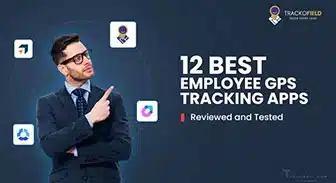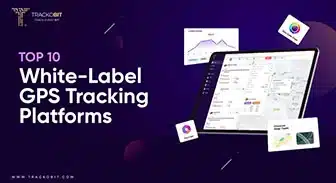-
TrackoBit
Manage commercial vehicles with the new-age Fleet Management Software
TrackoBit -
TrackoField
Streamline your scattered workforce with Field Force Management Software
TrackoField -
Features Resources
-
Blog
Carefully curated articles to update you on industrial trends. -
White Paper
Insightful papers and analysis on essential subject matters. -
Glossary
Explore an alphabetical list of relevant industry terms. -
What’s New
Get TrackoBit & TrackoField monthly updates here. -
Case Study
Explore the cases we solved with our diverse solutions. -
Comparisons
Compare platforms, features, and pricing to find your best fit.
-
About Us
Get to know TrackoBit: our team, ethos, values, and vision. -
Careers
Join the most dynamic cult of coders, creatives and changemakers. -
Tech Support
Learn about our technical support team and services in detail. -
Events
Check out the exhibitions where we left our marks and conquered. -
Contact Us
Connect with us and let us know how we can be of service.
How IoT is Improving GPS Tracking and Location-based Service
- Author:Diksha Bhandari
- Read Time:7 min
- Published:
- Last Update: December 9, 2025
Table of Contents
Toggle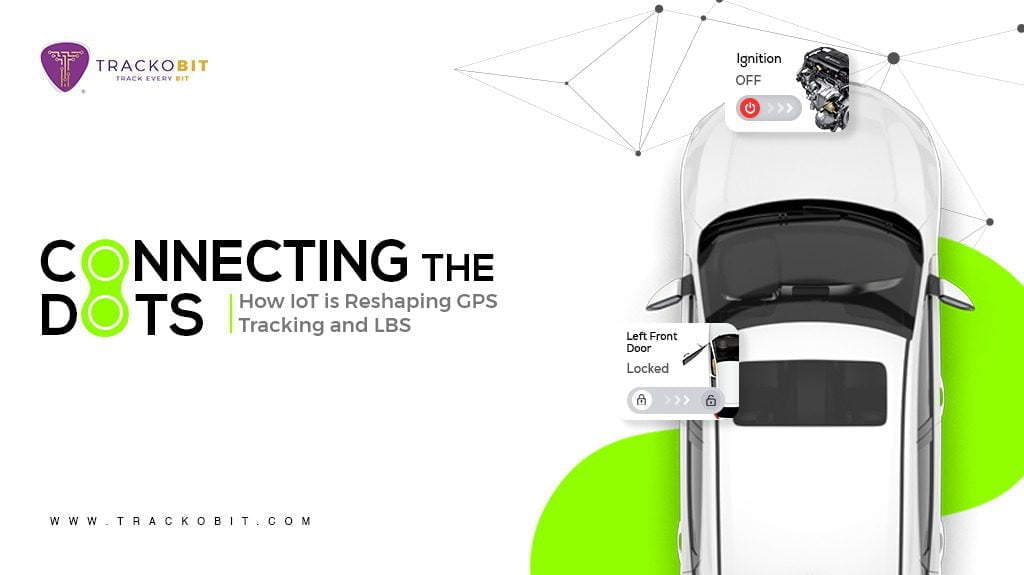
IoT is fueling the modern-day industrial revolution towards automation. Explore how IoT is improving GPS tracking and location-based services for good.
Table of Contents
Toggle
Imagine – you are on an exciting treasure hunt, trying to find hidden gems scattered across a vast landscape. But here’s the catch – you don’t have a map, clues, or any additional aid to track your progress.
Sounds impossible?
Well, picture a world where businesses face a similar predicament every day, but the stakes are much higher in terms of money, resources, and brand value. Take supply chain, transportation, logistics, and delivery management for an instant – in these industries, location-based insights are crucial to deciding on the next move in real-time.
Enters GPS tracking!
GPS tracking has revolutionised the way we navigate the modern world. Leveraging the power of GNSS, GPS tracking systems provide real-time locational data with on-point precision.
But, just when people thought GPS has touched the saturation point, the Internet of Things(IoT) glides in style. When coupled with real-time locational insights, IoT-empowered GPS tracking systems introduce a whole new realm of possibilities.
In this blog piece, we’ll uncover the secrets behind this incredible marriage of IoT and GPS tracking and how they are reshaping the world of connected mobility and interconnected ecosystem.
What is the Internet of Things (IoT)?
Let’s start with the basics!
The Internet of Things(IoT) refers to a vast network of interconnected devices, vehicles, appliances, software systems and other entities with connectivity capabilities. These IoT devices collect and share data, communicate with each other and are operable remotely via the internet.
The concept of smart homes, smart cities, and smart business operations is possible by virtue of IoT. It lays the solid foundation of a connected and smart society, driving innovation and transforming how we interact with our surroundings.
The Role of IoT in GPS Tracking
By seamlessly integrating GPS devices with a web of interconnected sensors and smart systems, IoT breaths in new life into location monitoring. Gear up for a paradigm shift as we delve into the pivotal role of IoT in enhancing remote connectivity, precision and real-time data sharing via GPS Tracking Systems.
1. Enhanced Connectivity and Data Exchange
While GPS is concerned with geo-locational data and time, IoT devices enable the collection and exchange of additional variables that are crucial for advanced automation.
But how does this exchange of data happen?
Leveraging wireless communication protocols such as Wi-Fi, Bluetooth, Zigbee or GSM networks, IoT devices share data with each other and the centralised unit. Sharing of real-time data allows up-to-date and accurate monitoring.
2. Improved and Vivid Tracking
The core concept of IoT is to build a well-connected ecosystem of smart technology to enable remote and automated operations. Therefore, the bigger the pool of data, the more precise the monitoring and management gets.
With more sensors and applications fetching data, contextual accuracy also improves along with locational tracking. For instance, fuel sensors, e-locks and other sensors provide additional insights, giving an in-depth and broader understanding to managers and owners about the fleet. In the cold supply chain, it’s crucial to get the real-time update on the temperature and humidity levels of the reefer similarly, while navigating through theft-prone areas, e-locks are a must.
IoT-enabled GPS tracking systems optimise overall businesses operation, ensure asset safety, and enable data-driven decision-making.
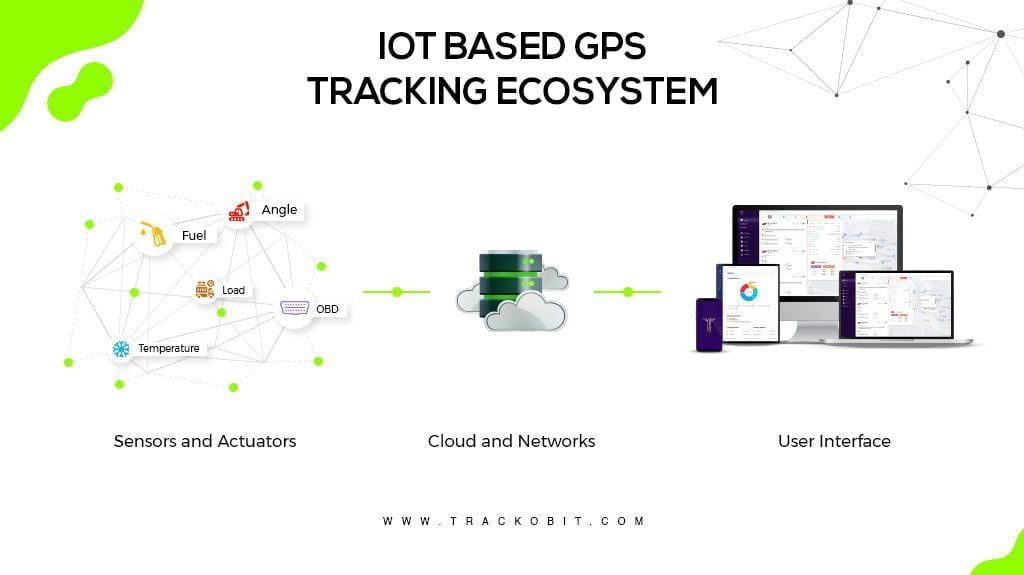
IoT Applications in GPS Tracking and Location-based Services
IoT working in coherence with GPS tracking is the marriage that everyone dreams of. The better the compatibility and connectivity, the richer the bond is.
Let’s celebrate some sectors where GPS tracking systems are leveraging IoT for significant gains.
-
Fleet Management and Logistics
Logistics and fleet organisations are sectors where GPS tracking systems are an ideal fit. IoT applications are also very common for big data sourcing, software-vehicle connectivity and intervehicle connectivity.
Analysing fuel consumption patterns, planning routes and trips, and managing deliveries and vehicle maintenance are also possible seamlessly with IoT.
-
Asset Tracking and Supply Chain Management
IoT-powered GPS tracking solutions play a pivotal role in asset tracking and supply chain management. These sectors usually operate in fragments. Hence, it becomes all the more essential to harness IoT for flawless interconnectivity.
It ensures asset safety, monitors the condition of valuable assets, tracks inventory levels, optimises the supply chain and prevents pilferages of any sort. Enhanced visibility, optimal operations and a streamlined supply chain are the cherry on top.
-
Personal Tracking and Safety
Personal tracking or individual safety is also a wider application of GPS tracking. With smartphones, smart watches and smart tags coming into common use, IoT has become a part of our lifestyle. Tracking down a lost phone or monitoring the well-being of kids or elderlies from afar are a few use cases where the application of GPS tracking along with IoT is usual.
-
Geofence Powered Marketing and Security
You must have noticed every time you are in the vicinity of a mall or a store, you receive a luring notification from the brands. This is the power of IoT. Similarly, in the security or field force sector, if an individual is getting closer to the forbidden zone, the alarm is triggered. Authorised access with RFIDs, barcode scanning, etc., is yet another application.
-
Smart City Operations
What do you think is the foundation of the concept of smart cities? Interconnectivity, right? The Internet of Things powers smart cities from pixel-level monitoring to predictive and preventive measures. Automating public transport management, facilitating intelligent parking spaces, smart traffic management and carbon emissions sensors are some use cases of IoT-powered GPS Tracking systems for advanced location based services in smart cities.
Future Trends of IoT-enabled GPS Tracking System
When we talk about the future or evolution of technology, two things that get all the attention to themselves are machine learning and artificial intelligence. Autonomous vehicles, precision agriculture, drone deliveries and environmental monitoring are some of the futuristic applications that will unfurl new possibilities for location-based services.
Let’s discuss the driving force that’ll enable these applications:
-
Big Data Analytics
The very first step towards automation and intelligent operations is analysing the pool of data collected via GPS, sensors and other sources to deduce insights and patterns.
-
Anomaly Detection
Identifying anomalies, unusual patterns and potential issues is the result of diagnostic analytics. Spotting security breaches and budget guzzlers is possible by virtue of big data.
-
Predictive Analytics
This final leg of data analytics is the fodder for ML and AI algorithms to enable proactive actions. Predictive analytics utilises historical data and presents possible outcomes in the future. The bigger and richer the database, the more accurate the predictions are.
-
Preventive Measures
This subset of machine learning uses data analytics and studies patterns to condition equipment, machine or vehicles to react proactively in real-time. Responding to maintenance needs, possible breakdowns, or probable actions in the most appropriate way.
Challenges of GPS Tracking Systems Backed by IoT
Every revolutionary innovation comes with its share of pros and cons. The users, on the other hand, are on the receiving end of the challenges technology poses and the high tides it faces while sailing through.
Let’s elaborate on the challenges of going with full-scale applications of IoT-powered GPS tracking systems across domains:
-
Connectivity and Network Reliability
Network and connectivity are the media on which IoT flows and flourishes. An unstable connection or regular network interruptions can affect data transmission and the real-time accuracy of data.
-
Data Security and Privacy
Installing more and more devices means opening more gateways for data to flow to and from. It widens the possibilities not only for new opportunities but also for new threats. Safeguarding sensitive location data, preventing unauthorised access and ensuring secure communication channels are some critical challenges.
-
Power Sourcing and Management
IoT devices require a power source to operate continuously. Setting up uninterrupted power supply to GPS tracking systems and IoTs need an efficient power management system backed by energy harvesting techniques.
-
Scalability and Compatibility
As IoT networks grow, ensuring compatibility and seamless integration among different devices, protocols and software solutions become complex. Scalability and interoperability are important for easy deployment and management.
-
Cost and ROI
IoT-based GPS tracking systems require an added cost for IoT devices and their installation other than GPS tracking systems. Apparently, the value they add to the operations cover-up for all the extra costs. However, it’s challenging to calculate the return on investment or establish a system to determine profits due to operational efficiencies.
Addressing these challenges requires a comprehensive approach, including IoT network optimisation, robust security systems, standardised protocols and scalable infrastructure. This will organically make way for advanced analytics capabilities and cost-effective implementation of location-based services.
Why are IoT-based GPS Tracking Systems a Thing of The Future?
The integration of IoT with GPS tracking systems has ushered in a new era of possibilities. Despite the challenges it poses, the potential benefits are immense. IoT-powered GPS tracking systems offer enhanced connectivity, real-time data sharing, enhanced accuracy, and confident decision-making.
IoT-backed GPS tracking systems will not only reshape the way logistics and supply chains operate globally but also widen the horizon for other sectors, including agriculture, construction, national security and defence.
Looking for a future-proof IoT-powered GPS Tracking system? TrackoBit is the name the leading industry experts swear by. Reach out to their team of experts!
Diksha Bhandari is the Content Marketing Manager at TrackoBit. With over a decade of experience in the media and advertising industry, she has transitioned her expertise to the world of software and t... Read More
Related Blogs
-
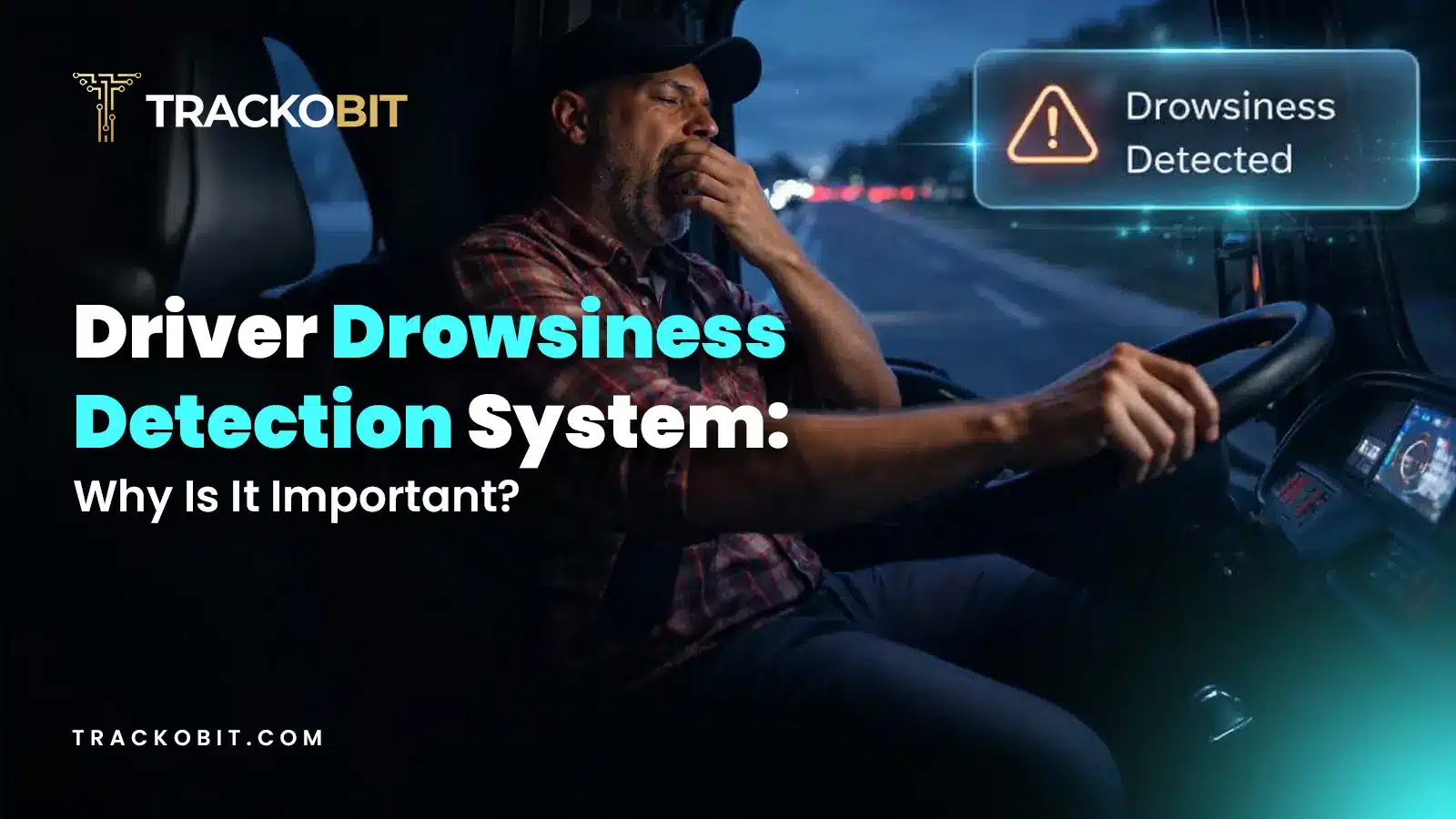
Why is Driver Drowsiness Detection System Important for Fleet Management?
Shemanti Ghosh February 4, 2026A driver drowsiness detection system is critical for fleet management. It helps prevent fatigue-related accidents and reduces operational risks through…
-
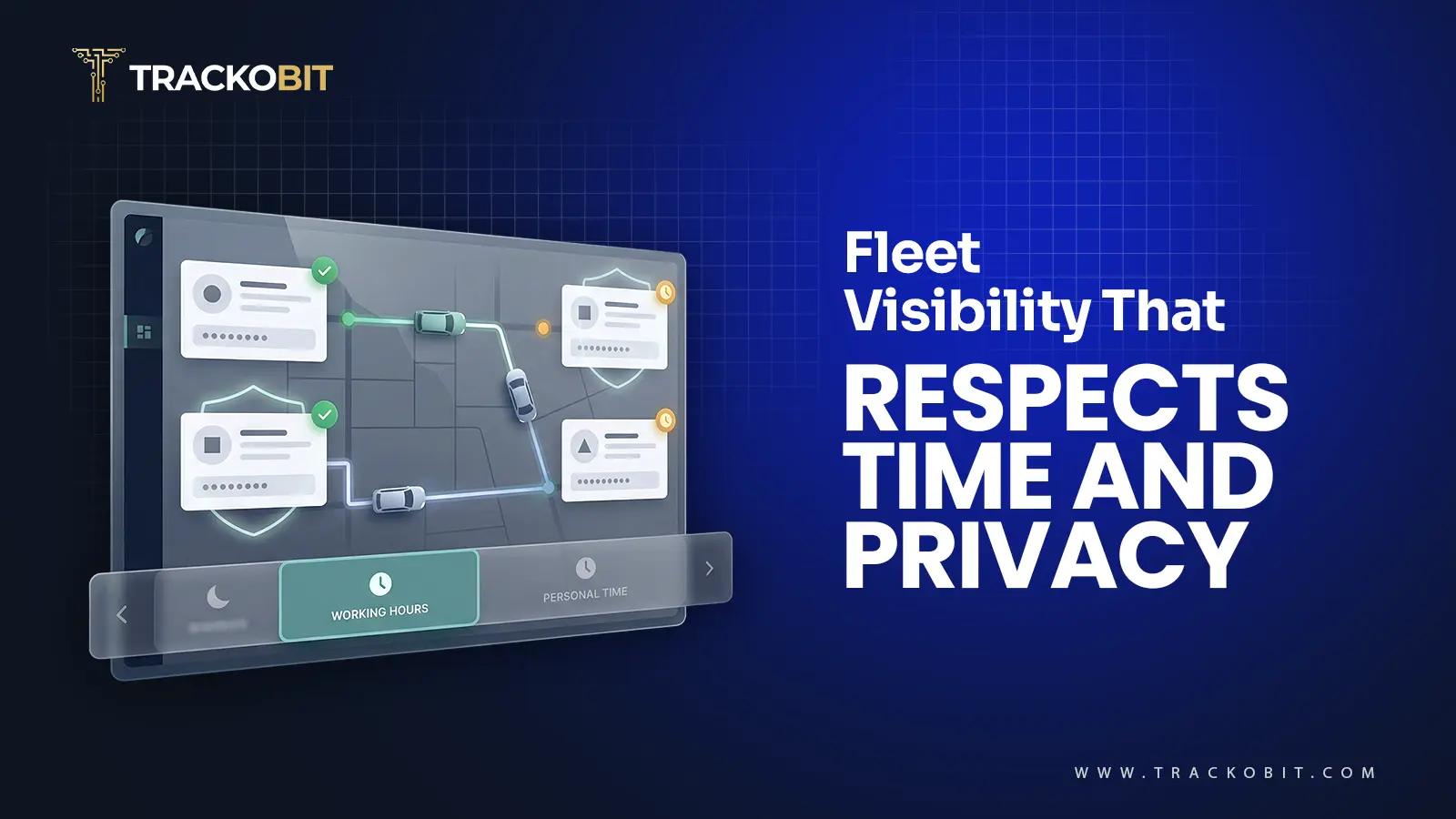
When Tracking Needs a Clock: Rethinking Fleet Visibility
Tithi Agarwal December 24, 2025Read on to understand why fleet tracking works better when it follows working hours. Because visibility should support operations, not…
-
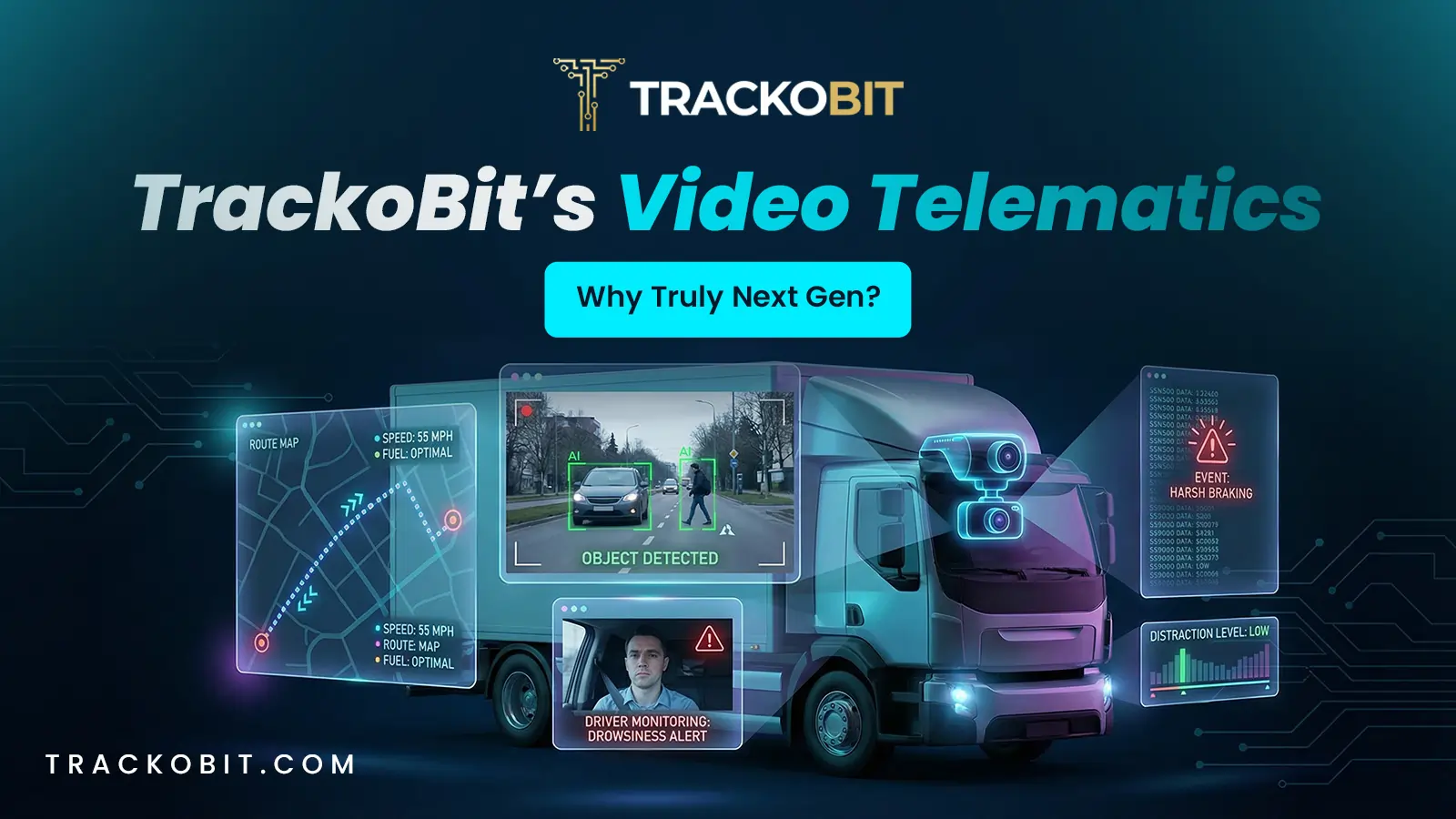
What Makes TrackoBit’s Video Telematics Software Truly Next-Gen?
Shemanti Ghosh December 17, 2025TrackoBit’s video telematics software blends smart video intelligence with full server control. The result? Superior fleet reliability and safety.
-
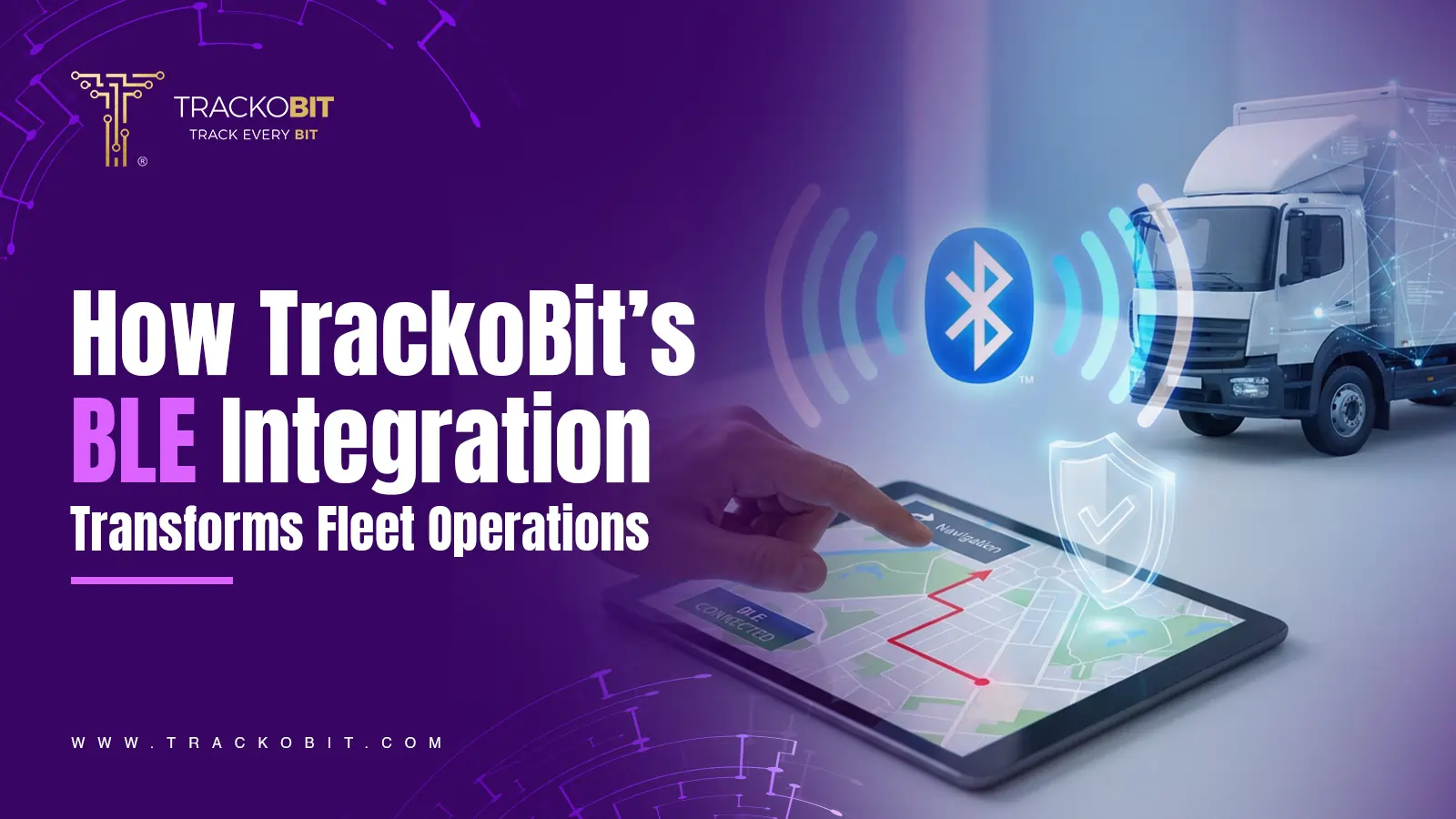
Plug, Pair, Perform TrackoBit Introduces BLE Sensor Integration
Tithi Agarwal November 26, 2025TrackoBit’s BLE Sensor Integration enables wireless, real-time monitoring with faster installs and accurate insights. It improves fleet efficiency, visibility, and…

Subscribe for weekly tips to optimize your fleet’s potential!
Your inbox awaits a welcome email. Stay tuned for the latest blog updates & expert insights.
"While you're here, dive into some more reads or grab quick bites from our social platforms!"Stay Updated on tech, telematics and mobility. Don't miss out on the latest in the industry.
We use cookies to enhance and personalize your browsing experience. By continuing to use our website, you agree to our Privacy Policy.


































